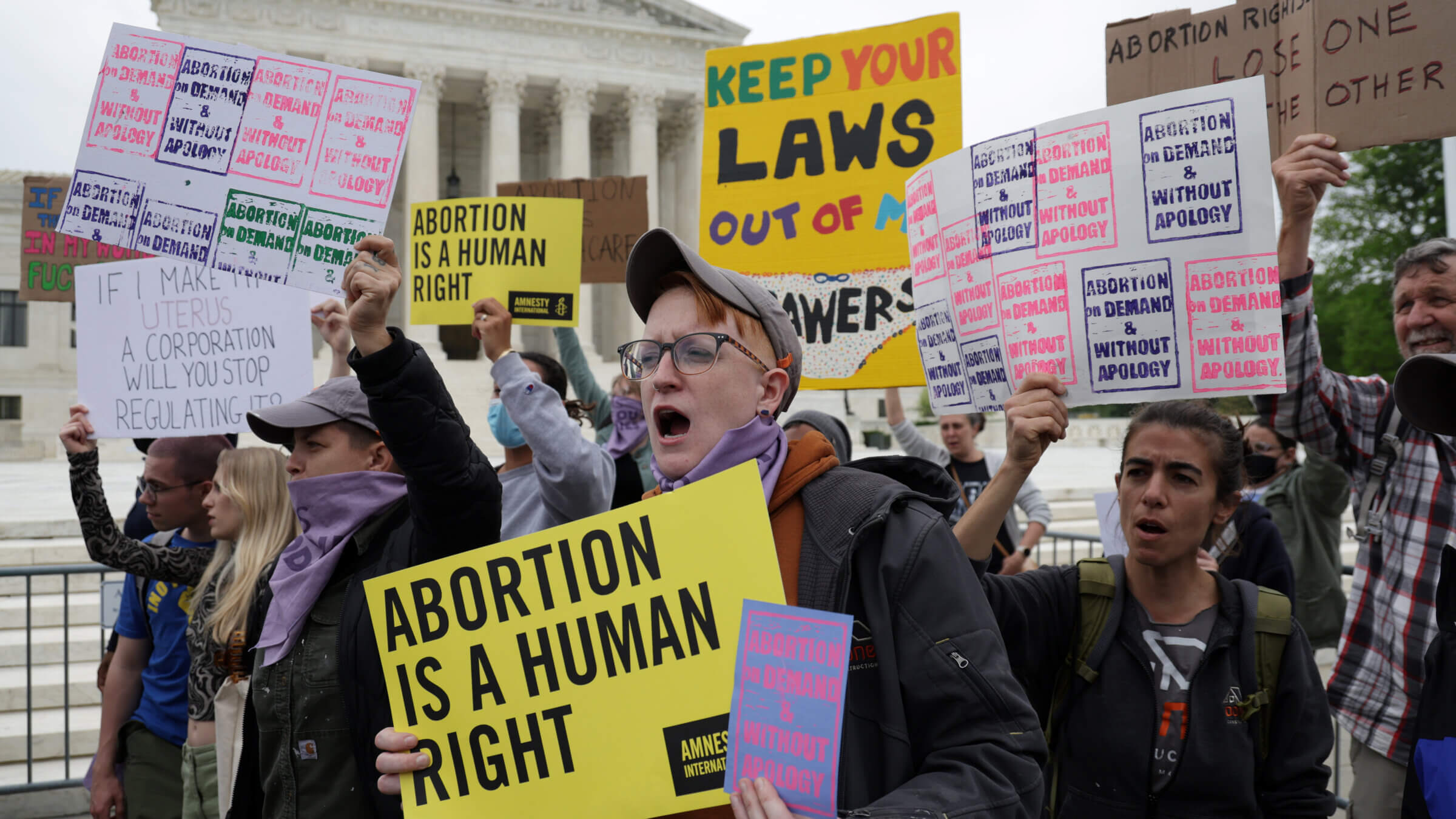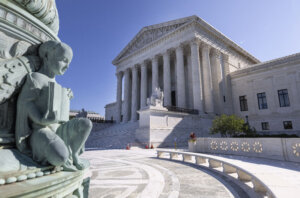What does Jewish law say about abortion?
Like most questions of halacha, it depends on who you ask.

Pro-choice activists protest in response to the leaked Supreme Court draft decision to overturn Roe v. Wade in front of the U.S. Supreme Court May 3, 2022 in Washington, DC. Photo by Alex Wong/Getty Images
When it comes to abortion, the Jewish legal source material is relatively thin. But what does it say, and how has it formed Jewish opinions on the topic?
These questions gained new urgency after a Supreme Court draft opinion was leaked late Monday: it lays out an argument to overturn Roe v. Wade, the 1973 decision to legalize abortion nationwide.
While the vast majority of American Jews — about four in five, according to the Pew Research Center — supports abortion rights, the Jewish legal view on abortion differs depending on denomination, and even then, on who you ask.
And though activists on either side of the abortion debate tend to divide the country into pro-life and pro-choice camps, the Jewish approach to the question is more nuanced.
For example, non-Orthodox Jewish denominations, which broadly support a woman’s right to an abortion, don’t necessarily ground the position in Jewish legal view of a woman’s bodily autonomy. Likewise, while many American Orthodox Jewish authorities rule that Jewish law prohibits abortion, they do not base their interpretation on the belief often propounded by Christian pro-life groups that life begins at conception.
Writing about abortion, Jewish scholars looking at the halacha, or Jewish legal underpinnings constructed their views from a variety of different sources discussing other things.
“Abortion is a big question socially, but in the Talmud there’s not much direct material on the topic,” said Chaim Saiman, the Chair in Jewish Law at Villanova University’s Widger School of Law. “It comes up sideways.”
Where everyone agrees is on the edges — on one end, that abortion is at best a last resort, and on the other, that it is required if the mother’s life is in immediate danger.
What the Torah says
Jewish legal opinion begins with a verse in Exodus 21 that institutes a financial penalty against a man who injured a pregnant woman, causing her to miscarry. As Rashi, the 11th-century commentator notes, that the consequence is only monetary indicates the Torah’s view that a murder has not been committed. Modern scholars extrapolate from Rashi that abortion is at worst not a capital crime.
A pair of 20th-century Orthodox rabbis, debating the permissibility of abortion when the child will be born with Tay-Sachs disease, a terminal genetic illness, split on the interpretation of this passage and other Talmudic sources.
Rabbi Moshe Feinstein, widely considered the leading American halachic authority of the late 20th century, said that the monetary punishment did not necessarily prove that killing an unborn child was not murder — in other words, that the seriousness of a crime could not be derived from its punishment. In his view, abortion would be prohibited even with the knowledge that the child would be born with a life expectancy of just a few years.
But an Israeli contemporary of Feinstein, Rabbi Eliezer Waldenberg, permitted an abortion in that case. He cited a Talmudic discussion of a fetus who is endangering the life of a mother — which the Sages say can be destroyed, limb by limb, until the moment the baby’s head emerges from the womb. Waldenberg relies on this source to rule that before the baby’s head emerges, the fetus is not considered a person and therefore abortion is not murder.
Yet even Waldenberg, who was also more expansive than Feinstein in his view of what threatens a woman’s well-being, believed those guidelines were to be used cautiously and on a case-by-case basis.
“If someone said, ‘We have five kids and used birth control and it didn’t work,’ Waldenberg would not permit an abortion,” Saiman said.
The divergence of Orthodox opinion on the matter has produced an unusual trend, Saiman said, in which some rabbis who generally follow Feinstein will direct congregants seeking halachic guidance on abortion to a rabbi who holds by Waldenberg.
Other Orthodox women will use informal channels to find out which rabbi is more likely to give them the guidance they are looking for.
In spite of the prevailing opinion within Haredi Orthodoxy that abortion is only permitted in the case of immediate risk to the mother, an umbrella Haredi organization has weighed in against abortion bans.
“Blanket bans on abortion, to be sure, would deprive Jewish women of the ability to act responsibly in cases where abortion is halachically required,” wrote Rabbi Avi Shafran of Agudath Israel wrote in 2019. “And so, what Orthodox groups like Agudath Israel of America, for which I work, have long promoted is the regulation of abortion through laws that generally prohibit the unjustifiable killing of fetuses while protecting the right to abortion in exceptional cases.”
Other Orthodox leaders rushed to distance themselves from the religious right that has been at the forefront of the pro-life movement.
“Orthodox Judaism’s view of abortion does not align with the Catholic church or the Christian right of today,” Rabba Sara Hurwitz, head of Yeshivat Maharat, an Orthodox women’s seminary, said in an email. “While there is a range of opinions in the sources, the halachic system shows tremendous compassion for the circumstances of the mother, family and the viability and health of the fetus. I have had the sad fortune of helping several families navigate their decision around abortion. Halacha recognizes that for some families, an abortion is a necessary choice.”

In non-Orthodox denominations
The Rabbinical Assembly — the international organization of Conservative rabbis — codified in 1983 a ruling that a fetus does not have legal status as a human until it is born, clearing the halachic path to permitting abortion. In addition to the Exodus verse, the ruling cites the halacha that a pregnant woman who converts does not need to separately convert the child after birth.
It said that in the case of the Tay-Sachs child, abortion would be permitted not out of mercy for the baby, but out of compassion for the mother.
In its seven-page decision, however, the RA made clear that abortion was anathema to Jewish concepts of the sanctity of life. Abortions to ensure the mother’s quality of life, it said, were impermissible.
In an interview Wednesday, Rabbi Bradley Shavit Artson, dean of the Ziegler School of Rabbinic Studies at American Jewish University, said that a shift towards deference to women’s autonomy had occurred in the Conservative movement in the decades since that ruling, precipitated in part by the now-widespread ordination of women and LGBT Jews.
“The idea that men should decide on women’s behalf is increasingly intolerable,” Artson said. “The Conservative movement, we’ve become more and more aware of the right of people to self-advocacy and self-determination.”
Additionally, he said, as the American religious right increased political pressure to restrict abortion, Conservative organizations leaned further into advocacy in the other direction to protect their religious freedom.
By and large, the textual basis for the Conservative understanding is the same as that of the Orthodox. Only on the question of which circumstances permit a woman to have an abortion — whether concern for the mother’s well-being extends to her psychological and emotional state — do the two movements diverge.
“In Judaism, a fetus is not regarded as an independent being; it is part of the body of the person carrying it,” wrote Rabbi Danya Ruttenberg in an explanatory post, citing the same Mishna as Waldenberg’s Tay-Sachs ruling.
The Reform movement, which holds that a woman’s bodily autonomy is a matter of “kavod ha’briyot,” the Jewish principle of respect for life, has been advocating for reproductive rights for decades.
Inveighing against a George W. Bush administration ban on late-term abortions, Rabbi David Ellenson, a national leader of the Reform movement and chancellor emeritus of Hebrew Union College-Jewish Institute of Religion, said in 2003 that “Jewish religious tradition surely accords the fetus status as potential life. However, Judaism does not regard the status attached to the fetus as potential life as morally equivalent to the condition enjoyed by the mother as actual life.”
That position was echoed by Mara Nathan, senior rabbi of Temple Beth-El, a Reform synagogue in San Antonio, who cited the same section in Exodus considered by Orthodox poskim, or legal authorities.
Nathan said the Reform movement viewed abortion as a human right, and she anticipated universal condemnation from the movement’s umbrella organizations.
“No one says that using abortion as a form of birth control is an appropriate choice,” Nathan said. “But the emphasis from the Reform perspective is on a women’s right to choose, women’s autonomy. They should be given the freedom as human beings to make a decision about their own health and their own bodies.”
The article has been updated after publication with quotes from Rabba Sara Hurwitz and Rabbi Bradley Shavit Artson. JTA contributed reporting.





















